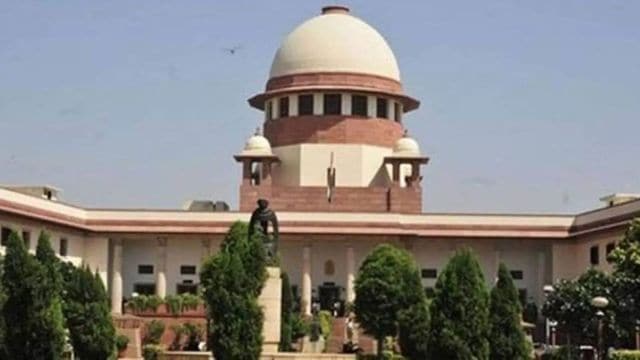Amidst a debate over the use of gender-neutral vocabulary to identify the sexes, a Supreme Court bench has opted to use the expression “pregnant persons” while stating in its order that pregnancy can also be experienced by “some non-binary people and transgender men among other gender identities”.
The 22-page judgement, authored by Chief Justice of India D Y Chandrachud, uses the expressions pregnant person or persons 42 times (including once in footnote) while adjudicating a matter pertaining to the termination of pregnancy of a 14-year-old girl who was sexually assaulted. By its April 29 order, a three-judge bench presided by CJI Chandrachud recalled its earlier order allowing a 14-year-old rape survivor to terminate her almost 31-week pregnancy. This came after her parents expressed concerns about her health in light of the inherent dangers of carrying out the procedure in an advanced pregnancy.

In a footnote on page 12, the bench, which also comprised Justices J B Pardiwala and Manoj Misra explained, “We use the term ‘pregnant person’ and recognise that in addition to cisgender women, pregnancy can also be experienced by some non-binary people and transgender men among other gender identities”.
Story continues below this ad
The ruling elaborated on the “primacy of the pregnant person’s consent in abortion” and also said, “In case there is a divergence in the opinion of a pregnant person and her guardian, the opinion of the minor or mentally ill pregnant person must be taken into consideration as an important aspect in enabling the court to arrive at a just conclusion”.
‘Very, very exceptional case’
On April 22, the SC had in the case of the minor allowed the request of the girl’s mother for the medical termination of pregnancy (MTP), terming it a “very, very exceptional case where we have to protect her”. The bench, which perused a medical report submitted by the dean of the Lokmanya Tilak Municipal General Hospital, Sion, Mumbai, said it “clearly opined that continuation of the pregnancy against the will of the minor may impact negatively on the physical and mental well-being of a minor who is barely 14 years old”.
Though the hospital authorities were asked to carry out the procedure, they sought further clarification saying the girl’s mother was changing her statements because of the likely risks of an MTP at such an advanced stage of pregnancy.
The bench then interacted with the medical team at Sion Hospital and the parents on April 29 and decided to recall its order. The bench also directed the Sion Hospital to bear all the expenses regarding the earlier hospitalisation of the minor and her re-admission for delivery as and when she is required to do so. In the event she and her parents, the bench said, desire to give the child up for adoption after the delivery, the State Government shall take all necessary steps per the applicable provisions of law to facilitate this. “This shall not be construed as a direction of this Court binding either the parents or the minor and the State shall abide by the wishes as expressed at the appropriate stage,” said the bench.
Story continues below this ad
The girl’s mother had approached the SC after the Bombay High Court rejected her request.
‘Diametrically opposite clarificatory opinion’
The SC noted after the girl filed a rape case, the medical board of the Grant Government Medical College & Sir JJ Group of Hospitals, Mumbai, prepared a report dated March 28, 2024, stating that the pregnancy may be terminated given the girl’s physical and mental health. It, however, sought the permission of the High Court since the gestational age of the fetus was above 24 weeks, which is the permissible age for termination of pregnancy under the MTP Act.
Subsequently, when the matter reached the HC, the medical board gave a diametrically opposite ‘clarificatory’ opinion dated April 3, 2024, “without re-examining ‘X’.” “The report denied the termination of pregnancy on the ground that the gestational age of the fetus was 27 to 28 weeks and that there were no congenital abnormalities in the fetus.”
Elaborating on this, the SC which touched upon the legislative intent of the MTP Act said, “Firstly, the health of the woman is paramount. This includes the risk avoided by the woman not availing of unsafe and illegal methods of abortion. Secondly, disallowing termination does not stop abortions, it only stops safe and accessible abortions”. “The opinion of the RMP and the medical board must balance the legislative mandate of the MTP Act and the fundamental right of the pregnant person seeking a termination of the pregnancy”.
Story continues below this ad
Pointing out that the fear of prosecution among registered medical practitioners acts as a barrier for pregnant people in accessing safe abortion, the top court said the Act protects the RMPs from penal provisions against abortion, under the Indian Penal Code, if it is carried out as per the statute. “Moreover, no penalty may be attracted to an RMP merely for forming an opinion, in good faith, on whether a pregnancy may be terminated. This is because the MTP Act requires and empowers the RMP to form such an opinion. It’s bona fide assured, no aspersions may be cast on the RMP. The same applies to medical boards constituted under Section 3(2-C) and Section 3(2-D) of the MTP Act”.
Taking into account the various issues arising before it, the bench also clarified, “The medical board, in forming its opinion on the termination of pregnancies must…also evaluate the physical and emotional well-being of the pregnant person in terms of the judgment”. It added, “When issuing a clarificatory opinion the medical board must provide sound and cogent reasons for any change in opinion and circumstances”.
Before this, in the SC’s March 4 judgment in the Sita Soren vs Union of India matter, CJI Chandrachud writing for the bench had chosen to rephrase the usually used “founding fathers of the Constitution” as “founding parents”.
While the use of gender-neutral vocabulary has gained currency in Western academic discourse, critics have not taken kindly to it.









